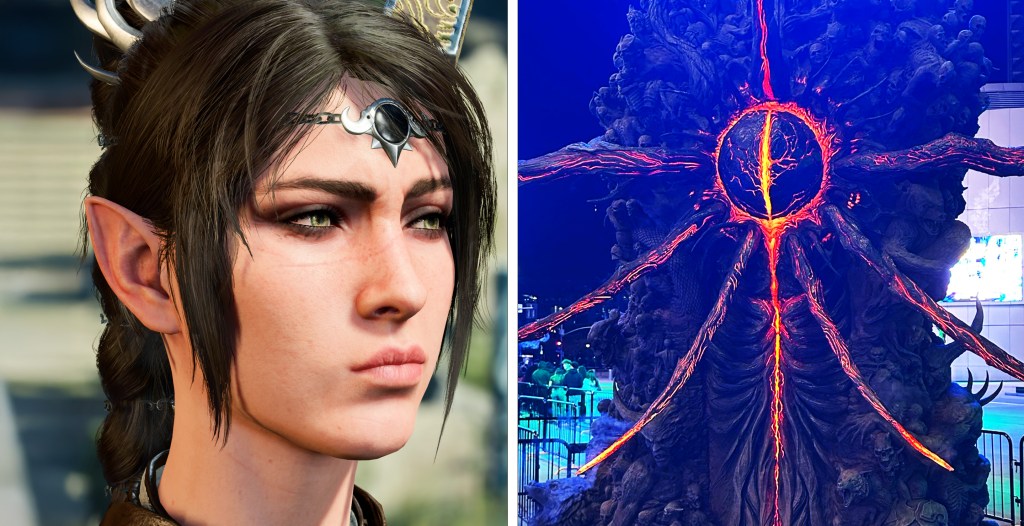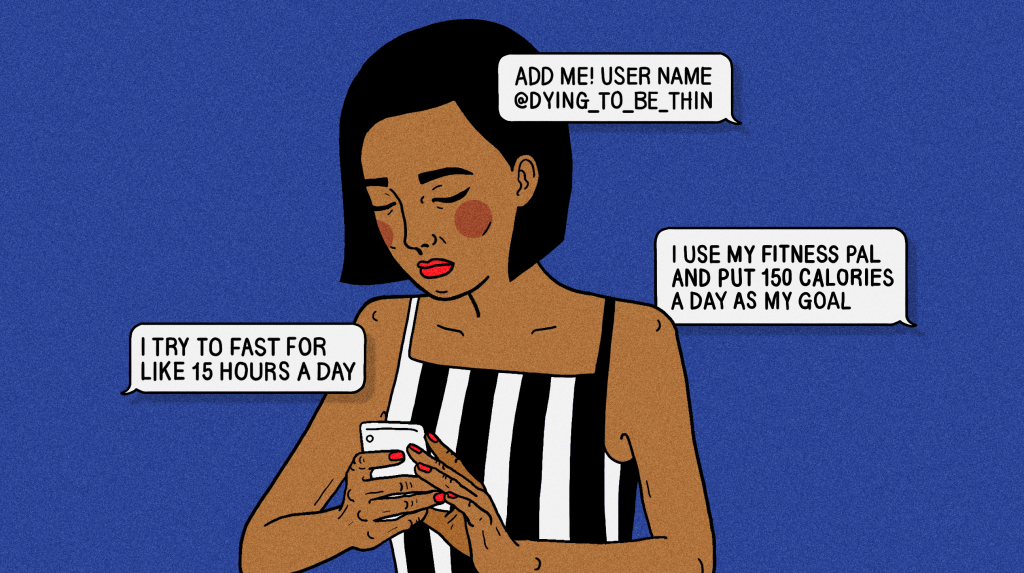Search “fasting,” “calorie counting,” “step tracking,” and “BMI” on the App Store, and you’ll be met with hundreds of results. What do all these things have in common? They’re all popular keywords for women suffering from eating disorders (ED), a community that is abusing popular apps in the dangerous pursuit of weight loss.
And for every new fad diet that appears, there’s an app. At the end of 2017, “water fasting” hit headlines—a diet in which followers consumed nothing but water, against medical advice. Water fasters logged their fasts using new-on-the-market app Vora, sharing their results on Instagram.
Videos by VICE
Launched in 2017, Vora allows people embarking on intermittent fasting regimes to create profiles, follow friends, publish fasts, and comment on other users’ fasts. While intermittent fasting is proven to have some health benefits—and while many saw the diet as nothing more than an effective way to lose weight—some eating disorder sufferers went down a different path.
“Got [a] new app, Vora,” a pro-ana Instagram account posted excitedly alongside a screenshot of six consecutive days of 15-hour-fasts. (Pro-ana social media accounts or forums typically celebrate and promote anorexia and can be a dangerous source of extreme dieting tips.) “I will still be at my ugw [ultimate goal weight[ by the end of year, if I can actually get off my fat ass.” Another screenshotted a 16-hour Vora fast, alongside the caption #thinsperation #almostskinnygirl. “I did it again. 15hrs water fast,” wrote a third. “Proud of myself again today. I’m eating an apple now, as my first meal in 15hrs and I’m gonna work out this evening…. I’m also gonna start increasing my fasting hours to challenge myself,” they went on.
ED sufferers created a community within the app, sharing usernames on pro-ana forums to motivate others to fast for longer. “You all motivated me to use that app again. I forgot how useful it was,” wrote a user. “This seems so exciting and encouraging… totally adding people on it!” said another fan. A third wrote, “I love the idea of a social feed full of people who fast, it will be so useful for accountability!”
For as long as we’ve had the internet, ED sufferers have congregated in pro-ana forums or, more latterly, on social media platforms such as Instagram, to compare notes and swap weight loss tips. But apps intended to encourage healthy behaviours such as walking more steps a day, or responsible weight management, can be ripe for misuse.
Although research into the links between apps and ED is limited, one 2017 study of 493 college-age students found a possible link between calorie tracking (using apps or FitBit-type devices) and disordered eating attitudes. Participants were asked to either note their fitness levels or calorie counts using tracking devices. “Individuals who reported using calorie trackers manifested higher levels of eating concern… Additionally, fitness tracking was uniquely associated with ED symptomatology,” researchers found, concluding that “for some individuals, these devices might do more harm than good.”
22-year-old Gráinne (who prefers to keep her surname private, for privacy reasons) has had an eating disorder for over a decade, and began tracking her fasts five years ago. “It was a pain using the clock on my phone so I kept looking for apps that would track the fasts for me,” she says. “Vora was the first app that that did what I wanted.”
Like with many ED sufferers, Gráinne’s disease encourages secretive behavior. “I don’t really like people knowing I’m fasting because then it’s harder to get away with. People are constantly on my back not to be fasting, so when I am I have to be as secretive as possible,” she explains.
But Vora’s creator Mark Halonen believes it can help ED sufferers. “While not the original intention of the app, Vora is helping those with eating disorders by providing accurate fasting data and a community to support them,” Halonen explains over email. “Intermittent fasting is the best way to manage and lose weight, and Vora is the best app for tracking fasting activity.”
“I have only seen encouragement and concern expressed on Vora towards those with eating disorders,” he adds.
Vora isn’t the only app being abused. On pro-ana forums, ED sufferers swap notes on their favorite apps. Several are regularly mentioned: MyFitnessPal, Eating Thin (“my favourite so far,” wrote one user, Toilet Tracker, CalorieKing, Plant Nanny, Chronometer, and Carrot Fit—an app that encourages weight loss by hurling abuse at users and electrocuting an obese avatar when weight loss goals aren’t met.
Erin Rose Puttock, a 21-year-old student and eating disorder activist, is now in recovery from the anorexia she developed at the age of 14. She regularly used exercise tracker app MyFitnessPal. “Eating disorders are all consuming and truly suck the life out of the sufferer. I was diagnosed with anorexia young and spent seven years in a kind of bubble,” she says.
“I had known about MyFitnessPal prior to becoming ill: I had struggled with body image issues from a young age and always had a strong desire to lose weight,” Puttock tells me. At the age of 14, Puttock got an iPhone—and she immediately downloaded the app. “I didn’t become obsessed with it straight away but gradually I became dependent on tracking my caloric intake,” she says.
Puttock’s use of the app quickly facilitated her disordered eating. “I used MyFitnessPal multiple times throughout the day, constantly checking and changing what I would eat and plan to eat so that it would always be within my ‘acceptable’ calorie range,” Puttocks remembers.
In addition to MyFitnessPal, Puttock also became hooked on the iPhone’s Health app—which currently has no option for deletion. “Around two years ago, I had a look on the app and realized it tracked your steps. A facet of anorexia is obsessiveness and compulsive behaviours so it didn’t take long for that to become another addiction,” she tells me.
“It became a compulsion to do a minimum amount of steps and walk a certain distance each day. If I ever did more one day, then the following day [I would make] the increased amount my minimum. Over time, it got out of control and I was so distressed because I never had time to do things as I had to get my steps in.”
Puttock wrote to Apple asking for the preinstalled Health app to be made optional, but never received a response. “I hate the app,” she says. “Apps like these are a part of the diet culture we live in and recovering from an eating disorder in a society that is trying to get one is very difficult.” Apple didn’t respond to Broadly’s request for comment.
Eilish (whose last name has also been withheld for privacy reasons), has suffered from anorexia since she was 12. The 19-year-old Texan started using MyFitnessPal initially as a way to track calories and exercise. “Then it became an addiction. I was logging in multiple times a day to add every little detail,” she remembers. “I probably used it upwards of ten times a day.”
In particular, Eilish points to the functionality of popular apps as a way for ED sufferers to engage in unhealthy behaviors.
“MyFitnessPal does give you an alert about eating under 1200 calories, but that doesn’t deter people from eating less,” she explains. “Those of us who do count calories and over-exercise see them as an easier way to track rather than doing it in our heads or writing it down.”
In the past, members of the eating disorder community expressed a dislike for MyFitnessPal due to its requirement to set your calorie goal to a minimum of 1200 calories. As this was above many ED sufferers’ hoped daily intake, the community found a way to hack the app to set a lower calorie goal. (MyFitnessPal didn’t respond to repeated requests for comment.)
Many of the ED sufferers I interview for this piece believe that apps exacerbate their illnesses. “Having an app telling me how far I’ve gone just spurs me on to want to fast more,” Gráinne says, telling me that she’s been hospitalized with severe tachycardia and dangerously low blood sugar levels as a result of her fasts.
The community component of these apps is especially triggering for some. “Anorexia is a competitive illness, and these apps enable competition with other people and yourself,” Puttock argues.
But what makes these apps so motivating for ED sufferers? “The vast majority of the time, apps will have a positive impact on lifestyle,” states Dr. Bryony Bamford, a clinical psychologist specializing in eating disorders. “However, when used by people who are susceptible to, or already have, extreme rules around their eating or exercise, they can become problematic.”
Wellness apps are often designed with gamification theories in mind. The idea is that by rewarding users with trophies or badges for receiving certain health-related goals, they’re motivated to achieve better healthcare outcomes. (One 2016 paper described the potential benefits of this technology as “substantial.”) But gamified apps could push driven ED sufferers to under-eat or fast for longer, or more often.
“For individuals who don’t have a dysfunctional relationship with food, gamification can provide the data and structure that’s needed to meet health-related goals,” nutritionist David Wiss told Today’s Dietitian. “For other individuals who are struggling with their relationship with food, gamification can make their food issues worse.”
Psychologist and eating disorder specialist Dr. Stacey Rosenfeld explains that the competitive nature of eating disorders forces what she terms “social comparison.”
“[Diet and fitness apps] can trigger increased symptoms,” Dr. Rosenfeld explains. “Many individuals with eating disorders compare their intake and weight to others. It used to be that these comparisons would occur only in real life and real time. Now, with social media and technology, the comparison group is global and time is irrelevant.”
“Sufferers can compare their food intake against someone’s from another country who posted the data three months prior. The comparisons are infinite,” she continues, adding that ED sufferers tend to be perfectionistic and think in black-and-white terms. “So, if someone is trying to restrict their intake but didn’t do as ‘good’ a job as someone that posted their intake prior, this might fuel distress, resulting in increased restriction in order to alleviate the distress around the perceived failure.”
Puttock agrees. “MyFitnessPal would often have stories or updates on its homepage announcing people’s weight loss and exercise which was incredibly triggering for me,” she says.

But not all the ED sufferers I speak to blame apps for aggravating their illnesses.
“I was going to count calories and macros anyway, and I could’ve done it in my head.,” Elish says. “Apps were just an easier way to do it, and the macro graph got me hooked on counting carbs/fats/proteins, but I have an eating disorder and would have found alternative ways to do these things,” she maintains.
I ask her if she thinks apps can encourage competitive dieting. “I’m not sure if that’s the right word for what some people do. They like to show off their bodies and how little they ate, but it’s so much more complex than I can begin to describe,” she replies.
“Competition adds to the stigma about eating disorders being attention-seeking. It’s more of a twisted comparison game that only hurts yourself.”
But how can app developers build anti-abuse protocols into their software, while continuing to provide functionality for users looking to diet responsibly? One solution to the app problem, Dr. Bamford says, would be a warning system. “I’d like to see warnings on these apps to alert people when their behaviors may be too extreme, or when their weight may be outside of a healthy range.“ Puttock suggests screening users for risky behaviors and redirecting them to mental health resources where necessary.
For now, fitness apps like Vora and MyFitnessPal are here to stay, with all the dangers they may entail to members of the ED community. But technology doesn’t have to be a negative thing. For every ED sufferer who abuses fitness apps to lose weight, there’s another who uses social media to track their recovery, or encourage healthier attitudes towards food.
Recovery Record instructs users to keep a record of their meals and how they felt after eating, using gamification methods to reward sufferers for positive behaviors. Others, such as Cognitive Diary, teach cognitive behavioral therapy (CBT) techniques to help sufferers understand their illness.
Both Puttock and Eilish are part of vibrant recovery communities on social media platforms such as Instagram. They openly discuss their struggles with food, and document their weight gain as well as time spent in ED clinics. Puttock even blogs about her recovery in a bid to educate and support other ED sufferers.
“I am motivated and determined to continue pursuing recovery until I can say that I am fully recovered,” Puttock wrote on her blog. “For now, I just want to share my personal experiences, break down some myths and stereotypes surrounding mental illness, and hopefully provide a little bit of hope for anyone in need of it.”
More
From VICE
-

3I/ATLAS -

Isaac Hayes (Photo by Anthony Barboza/Getty Images) -

Screenshot: Larian, X @shinobi602 -

Gene Siskel and Roger Ebert (Photo by Norm Staples/Getty Images)
